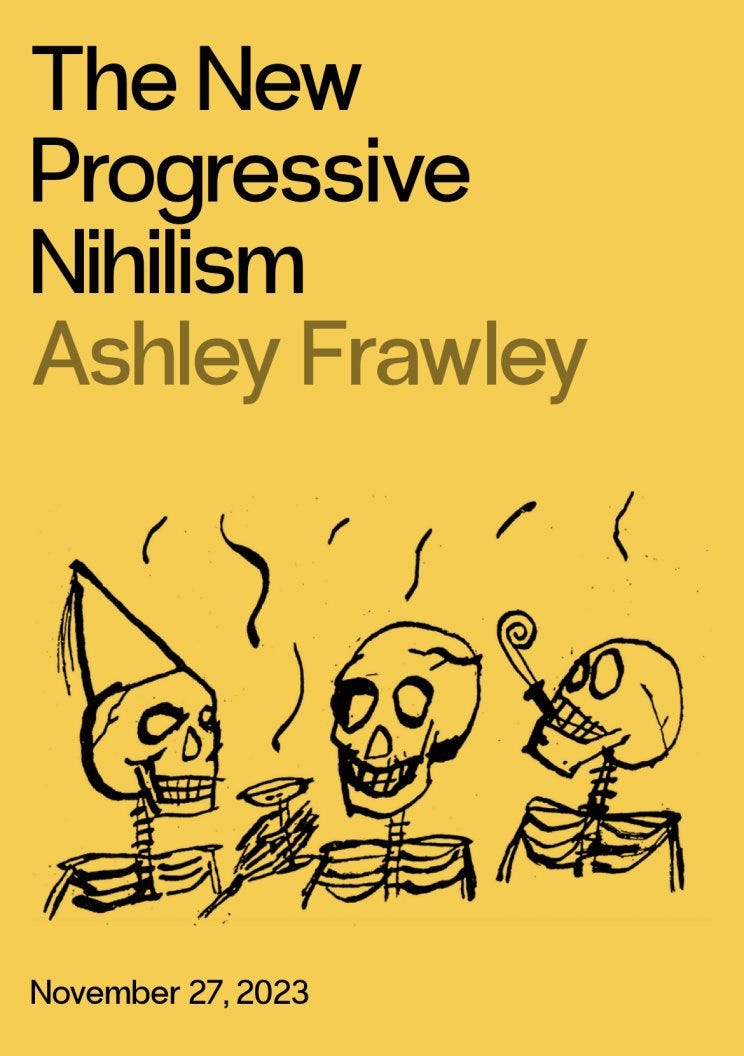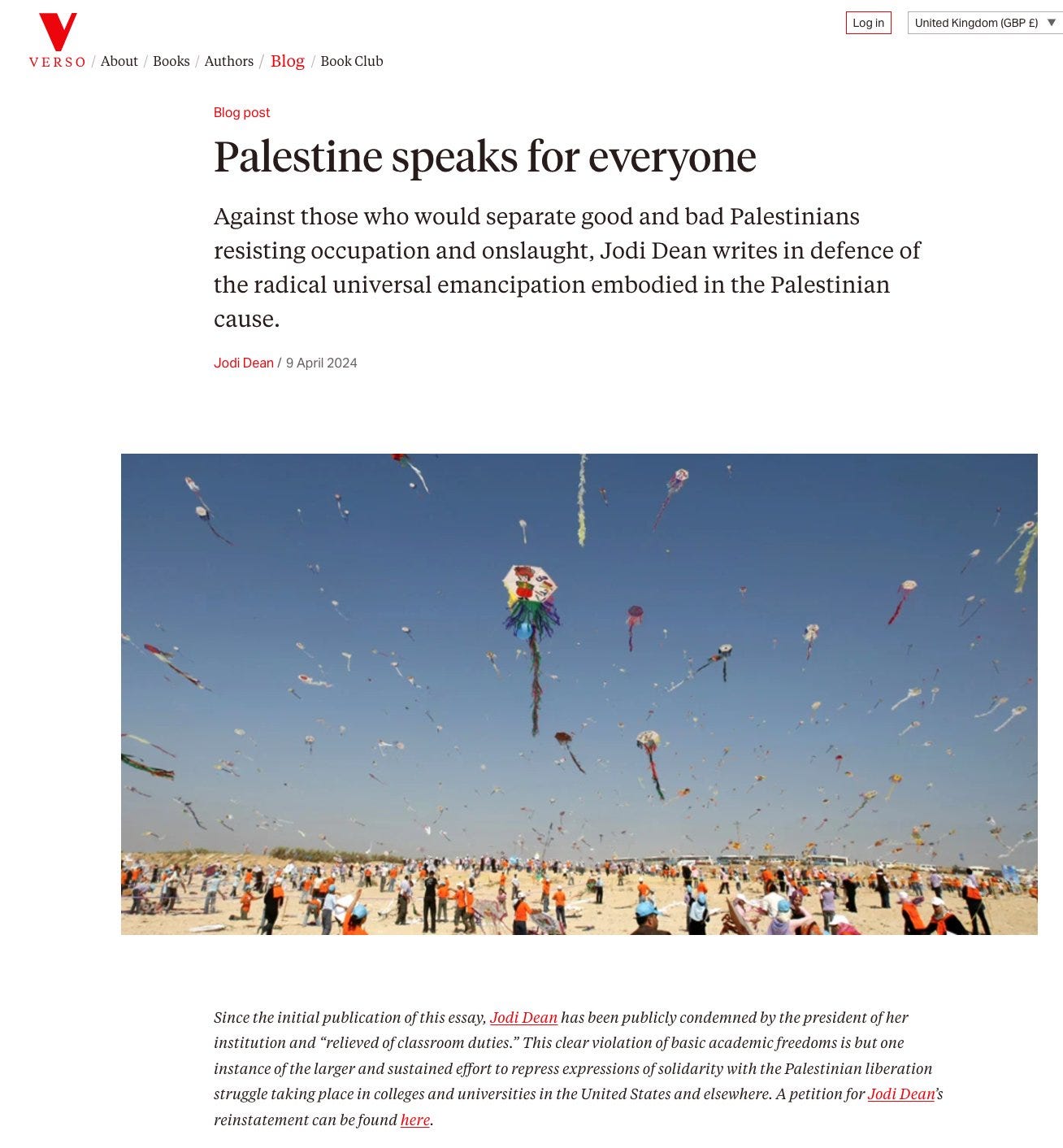In the wake of the October 7th attacks by Hamas on Israel, two distinctly divergent perspectives have emerged from the left. Ashley Frawley's "New Progressive Nihilism" and Jodi Dean's "Palestine Speaks for Everyone" represent this stark contrast. Frawley's piece criticizes the progressive left for its perceived descent into nihilism, while Dean's essay defends Palestinian resistance as a radical and necessary act of defiance against imperialism. This critique will explore these contrasting viewpoints, illustrating a tale of two lefts—one aligned with imperialist narratives and the other rooted in anti-imperialist solidarity.
https://www.compactmag.com/article/the-new-progressive-nihilism/
1. Manufacturing Consent and Propaganda
Frawley’s op-ed participates in what Herman and Chomsky describe as the “Manufacturing of Consent,” particularly through the sorting of "worthy" and "unworthy" victims. By adopting the language and perspectives often used by Western countries and Israel in their propaganda, Frawley fails to critically engage with the complexities of Palestinian armed resistance. This sorting mechanism frames Israeli civilians as innocent victims while portraying Palestinians, especially Hamas, as irrational aggressors. This selective sympathy obscures the broader context of systemic oppression and ongoing violence faced by Palestinians under Israeli occupation. Instead of acknowledging the legitimate grievances and resistance of an oppressed people, Frawley’s narrative aligns with imperialist discourses that dehumanize Palestinians and justify state violence.
Comparison with Dean: Jodi Dean explicitly challenges this dichotomy, arguing against separating "good" and "bad" Palestinians. She contends that the Palestinian cause embodies radical universal emancipation and criticizes the portrayal of Palestinians as only victims rather than as active agents of resistance. Dean’s approach highlights the symbolic and emancipatory aspects of Palestinian resistance, contrasting sharply with Frawley’s alignment with imperialist narratives.
Photographer unknown
2. Lack of Expertise and Potential Bias
Frawley, a sociologist who typically critiques the wellness and mindfulness self-help industry, steps outside her area of expertise in this op-ed. By doing so, she risks being perceived as a "useful idiot" for political agendas, particularly those of Israel and the United States. Her sudden engagement with the Israel/Palestine conflict, without a nuanced understanding of the historical and socio-political context, diminishes her credibility. It suggests an opportunistic alignment with dominant narratives rather than a thoughtful, informed analysis. This shift in focus raises questions about her motivations and the underlying biases that might influence her perspective.
Comparison with Dean: Dean is deeply embedded in anti-imperialist and radical thought. Her defense of Palestinian actions comes from a place of solidarity with global struggles against oppression. Her expertise in this area lends credibility to her arguments, as she situates Palestinian resistance within the broader context of global anti-imperialist movements.
3. Secular Morality Play and Marginalization of Western Atrocities
Frawley's argument reads like a secular morality play that marginalizes the extensive death and destruction wrought by Western regimes and cultures both domestically and internationally. She critiques progressive nihilism and the celebration of death but overlooks the historical and ongoing violence perpetrated by colonialism, imperialism, the "war on terror," the "war on drugs," and sanctions imposed by Western powers. This selective moral outrage creates a double standard, where Western violence is normalized or justified, while resistance by oppressed groups is condemned. Such a perspective fails to address the root causes of violence and the asymmetrical power dynamics at play, reinforcing a narrative that upholds Western hegemony and silences the voices of the marginalized.
Comparison with Dean: Dean directly addresses and condemns the imperialist and colonialist actions of Western and Israeli forces. She situates Palestinian resistance within the broader context of global anti-imperialist struggles, highlighting the hypocrisy in condemning Palestinian resistance while ignoring Western violence. Dean’s perspective underscores the importance of understanding the systemic roots of oppression and the legitimacy of resistance movements.
https://www.versobooks.com/en-gb/blogs/news/palestine-speaks-for-everyone
4. Oversimplification of Complex Issues
Frawley’s portrayal of progressive nihilism oversimplifies the motivations and ideologies of diverse groups. By lumping together various movements and actions under the umbrella of nihilism, she disregards the specific contexts and goals that drive them. For instance, climate activists block roads to draw attention to environmental crises, not to perpetuate nihilism. Similarly, the support for Palestinian resistance is rooted in a desire for justice, truth, and liberation, not a nihilistic rejection of life, except perhaps among a few fringe individuals, infiltrators, and 'antifa' larpers.
Comparison with Dean: Dean acknowledges the complexity of Palestinian resistance, emphasizing its historical and symbolic significance. She understands the multifaceted nature of these actions and their impact on Palestinian morale and global solidarity. Dean’s analysis recognizes the legitimate aspirations driving resistance movements, contrasting with Frawley’s reductionist approach.
Coda
The debate between Frawley's "Progressive Nihilism" and Dean's "Palestine Speaks for Everyone" exemplifies a tale of two lefts, highlighting a fundamental ideological split. Frawley's alignment with dominant narratives and her reductionist critique of progressive movements stand in stark contrast to Dean's informed and empathetic defense of Palestinian resistance. It is crucial to recognize the importance of solidarity with oppressed peoples and places, acknowledging their legitimate grievances and aspirations while emphasizing the need for a united front against systemic oppression and imperialism.
This is not merely an academic debate; it is a matter of life and death. With what the ICJ ruled to be a 'plausible genocide' being carried out in Gaza now, fully supported by the US, UK, and EU governments, the urgency of these debates is stark. The potential for this conflict to spread into a regional war makes it imperative to confront these realities with clarity and compassion, advocating for truth and humanity in the face of escalating violence and depravity.








